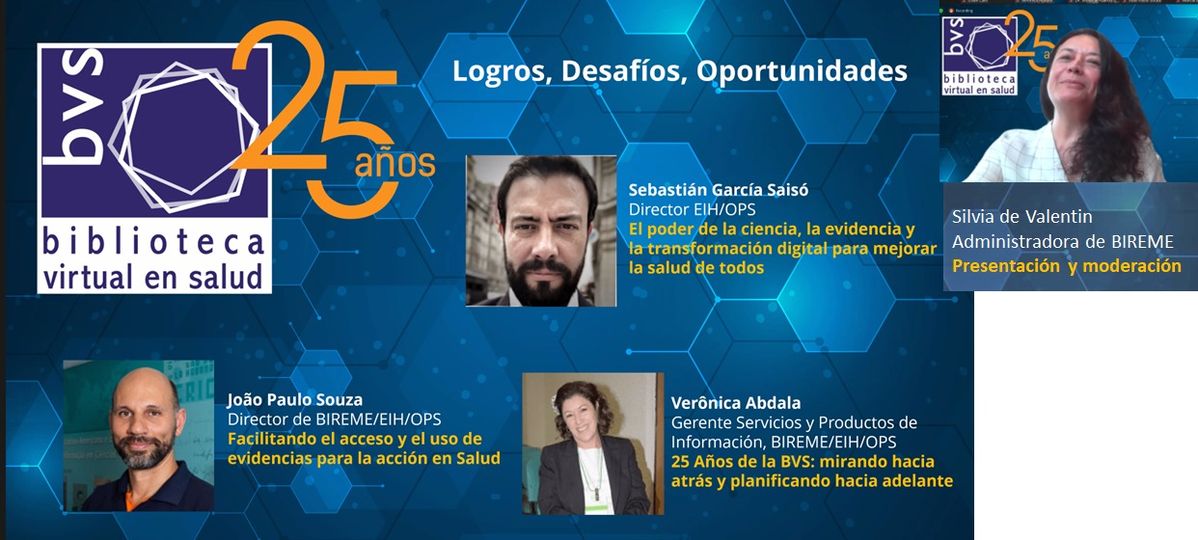
São Paulo, March 27, 2023. Twenty-five years ago, in 1998, the Latin American and Caribbean Health Information Network approved the Declaration of San José “Towards the Virtual Health Library”. Since then, BIREME has been leading the development of the VHL model (Virtual Health Library) as a technical cooperation strategy in health information and knowledge management by PAHO/WHO for Latin America and the Caribbean, with expansion to Spain , Portugal, Mozambique, and other Portuguese-speaking countries in Africa.
The major challenge at the time was to realign the technical cooperation carried out by BIREME since its creation in 1967, when it was developing essential functions as a Regional Library, promoting access to scientific and technical information in health and shared use of collections and services between libraries.
The VHL was a response to the emergence of the Internet and represented an evolution of BIREME's technical cooperation that culminated in a new process for operating information sources through the Network, making users' access to information more agile. Since then, the VHL Model has evolved naturally and adjusted to the Region’s different contexts. The VHL Guide, which presents the fundamentals of the health information management model based on collaborative and networked work, has been revised and updated four times, most recently in 2020.
The VHL has always been in line with BIREME's mission: to provide access to health information and scientific evidence to users from all health sectors, contributing to narrow the gap between knowledge and practice in Latin American and Caribbean countries. It was recognized as a good practice in the 4th volume of the publication “Good Practices in South-South and Triangular Cooperation for Sustainable Development” of the United Nations Agency for South-South and Triangular Cooperation (UNOSSC). The publication was launched on September 12th, 2022, in Bangkok, Thailand, during the high-level commemoration of the United Nations Day for South-South Cooperation, within the framework of the Global South-South Development Expo 2022, with the participation of the PAHO/WHO Country and Subregional Coordination team.
Today, BIREME's technical cooperation and the efforts of the Network materializes mainly in the more than 60 VHL instances (national, thematic, and institutional), more than 50 databases and dozens of information products built from these databases, such as are Windows of Knowledge, Evidence Maps, infometrics, etc. It is worth highlighting the information systems and methodologies developed by BIREME and made available to the Network with the objective of enabling the management and dissemination of information in a dynamic and integrated way: the LILACS Methodology, the FI-Admin system, DeCS and the Integrated Interface Search (IAHx).
There were many achievements and many challenges. We experienced the advancement of digital collections, cloud storage, open science, open data, institutional repositories, free software, and we definitely arrived in the age of Artificial Intelligence (AI). And the inevitable question is: will information search services that use AI robots replace the VHL? We asked ChatGPT this question and received the following answer:
No, ChatGPT and VHL (Virtual Health Library) are completely different tools and cannot be compared directly.
The VHL is an initiative of the Pan American Health Organization (PAHO) to provide free and open access to health information and knowledge, through a network of health information sources, such as libraries, databases, scientific publications, and other sources. The VHL is a health information search platform that is used by health professionals around the world.
ChatGPT is an artificial language model developed by OpenAI to process and generate natural language. It is used to help answer questions, perform natural language tasks, and generate text in various fields such as virtual assistants, chatbots, translators, text summaries, and more. Therefore, while the VHL is a platform to access health information, ChatGPT is a tool to help process information and generate natural language. They are complementary in their functionality and there is no intention of replacing the VHL with ChatGPT.
AI is definitely a great opportunity that opens up for expanding access to health information and that can contribute significantly to achieving BIREME’s mission and strengthening the VHL, whose fundamentals open access, collaborative and networked work, information management, and information quality remain valid, but the way to implement and deliver information services must undergo a tremendous transformation.
The VHL’s 25th anniversary event celebrated its history and impact on LA&C and other regions. As speakers, Sebastián García Saisó, Director of EIH/PAHO, and for BIREME, João Paulo Souza, Director and Verônica Abdala, Manager of Information Products and Services. Silvia de Valentin, Administrator, was in charge of moderation. Highlights of the meeting included VHL’s trajectory and relevance for action in health and the new BIREME 2023-2025 strategy that foresees the development of health information products and services aligned with the transition of the world in which we live.
More than 180 members of the VHL Network from Argentina, Belize, Bolivia, Brazil, Cape Verde, Chile, Colombia, Costa Rica, Ecuador, El Salvador, Germany, Guatemala, Guyana, Honduras, Jamaica, Mexico, Mozambique, Paraguay, Peru, Puerto Rico, Spain, Trinidad and Tobago, United States, Uruguay and Venezuela participated in the event.
Access the Window of Knowledge VHL 25 years: https://bvsalud.org/vitrinas/en/post_vitrines/vhl-25-years/




